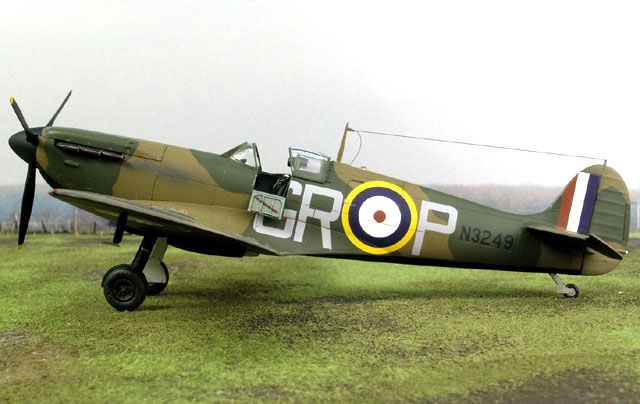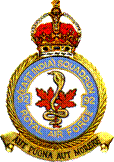|
Spitfire Mk.Ia
by David Turner
|

|
|
Supermarine Spitfire Mk Ia
No 92 (East India) Squadron |

Tamiya's 1/48
scale Spitfire Mk.I is available online from
Squadron.com
Tamiya 1/48 Spitfire Mk Ia
No 92 (East India) Squadron
Motto: “Either Fight Or Die”
 On
May the 1st 1940, RST was posted to No 92 Squadron under the
command of Squadron Leader Roger Bushel. This gallant officer was to
become legendry as “Big X” at Stalag Luft III and led the famous escape.
He was one of sixty executed by the Gestapo upon their recapture. Tuck
was promoted to the rank of Flight Lieutenant and appointed as a flight
Commander by Bushell. On
May the 1st 1940, RST was posted to No 92 Squadron under the
command of Squadron Leader Roger Bushel. This gallant officer was to
become legendry as “Big X” at Stalag Luft III and led the famous escape.
He was one of sixty executed by the Gestapo upon their recapture. Tuck
was promoted to the rank of Flight Lieutenant and appointed as a flight
Commander by Bushell.
During the frenetic activity of the
Dunkirk evacuation, RST gained the first of his aerial victories, a
Messerschmitt Bf-109, on the morning of May 23rd and added
two Bf-110s during the afternoon. However, his final victim of the day
had also scored, with Tuck being forced to “dead stick” his
battle-damaged Spitfire on to the grass verge in front of the Hornchurch
control tower.
The elation from his victories was
short-lived, with the news that the squadron had suffered heavily,
almost half it’s strength had gone, including the Commanding Officer.
Group Captain “Daddy” Bouchier made the decision to give Tuck the
squadron. Under RST’s leadership, gone were the out-dated Fighter Area
Attacks and tight, three-ship “vic” formations became a thing of the
past.
His personal score began to mount over
the coming days. His bravery and skill was recognised, with the award of
the Distinguished Flying Cross on June 11th. His Majesty King
George VI presented his award at a ceremony at Hornchurch, on June the
28th. It was to be the first of many meetings with royalty.
The Model
The next Spitfire is marked as GR o P,
N3249 during May 1940. This aircraft is believed to be the Spitfire
flown on May 23rd, when RST gained his initial victories. It
is depicted in the standard “B” pattern camouflage scheme of Dark Earth
and Dark Green. However, as an additional recognition feature adopted in
late 1939, the undersides of the aircraft were divided evenly along the
fuselage centreline, with the port side being painted in Night and the
starboard in white. Polly Scale Dark Earth and Dark Green were used,
along with Tamiya Flat White. The “Night” was mixed from Tamiya Dark Red
and Flat Black, after reading Brett Green’s excellent Tamiya Spitfire Ia
review on HyperScale.
The superb Tamiya kit received the
following minor additions:
·
Once again, the
kit seat was replaced with the Cutting Edge Spitfire seat. This time
without the moulded harness. (CEC48349)
·
An Eduard
“Sutton” harness was added. As was Eduard PE armour plate to the rear of
the seat. (More on this to follow)
·
The exhausts were
replaced with items from Ultracast.
·
Decals were again
from the outstanding Victory Productions set.
Following completion of this model,
(isn’t it always the way?), I purchased the excellent “Spitfire – A
Complete Fighting History” by Alfred Price, (1991, Promotional Reprint
Company). This is a combination of his “Spitfire At War” and “Spitfire
At War 2.”
They say that 20/20 hindsight and zero
groundspeed is a beautiful thing. I would agree. Using the reference, I
believe there is sufficient evidence to question the authenticity of
this scheme, for the timeframe involved. Pg 29 shows a photo of RST,
with P/Os Holland and Wright, standing in front of Spitfire GR o U. It
has the Night port wing and appears to be Duck Egg Green on the
remainder of the lower surfaces, with the starboard wing (possibly) in
white.
As to the armour plate, I added the
armoured glass windscreen, as well as the seat-back armour. On
re-reading “Fly For Your Life” by Larry Forrester (again, after model
completion), Tuck states that the armoured windscreen was only fitted
just prior to the afternoon sorties on the 23rd of May and,
was the only armour the aircraft had at that stage. Cest la guerre.
Anyway, I am happy with the final result and the scheme is pleasing to
the eye.
Click on the thumbnails
below to view larger images:
Model and Text Copyright © 2003 by
SQNLDR David Turner
Model Images Copyright © 2003 by
Brett Green
Page Created 15 September, 2003
Last Updated 25 March, 2004
Back to HyperScale
Main Page
|
Home |
What's New |
Features |
Gallery |
Reviews |
Reference |
Forum |
Search